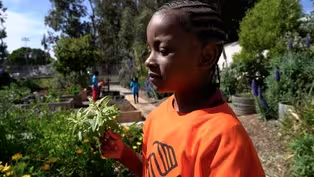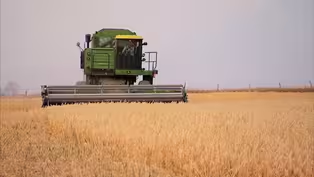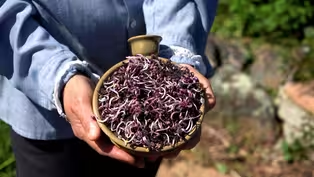
Rainwater Ranch
Clip: 9/20/2024 | 5m 21sVideo has Closed Captions
Meet a husband-and-wife team growing and selling organic flowers.
Visit Rainwater Ranch in Northern California, where a husband and wife say they are passionate about growing organic flowers they sell at farmers markets. Even though many people understand the benefits of eating organic food, the couple explains why customers should consider displaying organic flowers on their dinner table as well.
Problems playing video? | Closed Captioning Feedback
Problems playing video? | Closed Captioning Feedback
America's Heartland is presented by your local public television station.
Funding for America’s Heartland is provided by US Soy, Sustainable Agriculture Research and Education, Rural Development Partners, and a Specialty Crop Grant from the California Department of Food and Agriculture.

Rainwater Ranch
Clip: 9/20/2024 | 5m 21sVideo has Closed Captions
Visit Rainwater Ranch in Northern California, where a husband and wife say they are passionate about growing organic flowers they sell at farmers markets. Even though many people understand the benefits of eating organic food, the couple explains why customers should consider displaying organic flowers on their dinner table as well.
Problems playing video? | Closed Captioning Feedback
How to Watch America's Heartland
America's Heartland is available to stream on pbs.org and the free PBS App, available on iPhone, Apple TV, Android TV, Android smartphones, Amazon Fire TV, Amazon Fire Tablet, Roku, Samsung Smart TV, and Vizio.
Providing Support for PBS.org
Learn Moreabout PBS online sponsorship- [Announcer[ When you think of a flower farm, many people envision a garden of flowers that bloom year round, a place of relaxation and beauty.
But in reality, running a flower farm is work, really hard work.
- We harvest five to sometimes seven days a week so that we can make sure that everything's harvested at its perfect harvest stage, put into our flower cooler, and then taken to the sales, to outlets or to the customers as quickly as possible.
We're hustling.
We're harvesting fast, we're walking fast.
- Just the amount of work involved in farming flowers, there's weeds.
There's a lot of work, it's very laborious.
- Lee Milan and Lauren McNeese make up the husband and wife team behind Rainwater Ranch.
It's a flower and orange farm in the Northern California town of Winters.
Their bouquets of organically grown flowers are sold at farmer's markets and grocery stores in the spring and summer while their oranges are in peak season during the winter.
Lauren heads up harvesting and sales.
Lee can usually be found out on the tractor.
- I'm primarily responsible for preparing the field for planting.
We actually plant weekly, biweekly, and monthly, so we have to constantly prepare sections of the field, but we have to be mindful about not planting the same spot on the field with the same plants to stay away from potential issues with disease and pests.
- [Announcer] Avoiding disease and pests is especially important for this certified organic farm, which doesn't use synthetic chemicals on their crops.
And while many people have a good understanding of the benefits of eating organic food, this couple says there are similar benefits to displaying organic flowers in their homes.
- I like to think that we're producing something that is completely safe for people's dining room tables.
They're not sprayed with pesticides, they're not fed with anything synthetic or anything harmful.
So they're, I tell our customers, "They're safe for your table" as opposed to something say that you would buy at a big box store.
- [Announcer] About 80% of the cut flowers sold in the US actually come from elsewhere like Central and South America.
Although fresh flowers are grown in every state, California and Florida make up the bulk of domestic sales due to their warmer climates.
Lauren says customers are increasingly aware of where their bouquets come from.
- And that's why they choose to support us at farmer's markets and elsewhere.
And we really appreciate all the customers who are interested in knowing where their products come from and where their money's going.
And we're happy to be very open and transparent about all of it so that people can make the right consumer choices for themselves and support operations like ours where we're trying to be good stewards of our land.
- [Announcer] Rainwater Ranch is more than 50 years old.
In 2014, Lauren and Lee bought the 20 acre property from the previous owners, the Rainwaters.
They love the name and decided to keep it.
They converted the existing seven acres of naval orange trees to certified organic, welcome to flock of sheep, and began growing flowers to turn the ranch into a year round operation.
Lauren and Lee were both working at the University of California when they decided to become full-time farmers.
Of the two, Lee had more of a traditional farming background, having grown up working on his family's farm in the Philippines where they grew rice and fruit.
- The farm in the Philippines, it was a fairly large operation, but we didn't own a single machine.
But the whole program, the whole farm was ran with beast of burdens, primarily water buffaloes.
- [Announcer] Many farmers in Southeast Asia use water buffaloes to loosen and turn the soil to prepare for planting.
Lee immigrated to the United States at age 12 and went on to study agriculture in college.
- We're both inherently interested in agriculture, and I think it was just a calling for both of us.
We love this property, we love living here.
This is also our home, but it's also a piece of land that we can maintain and take care of in the ways that are important to us.
- That really is one of the main things.
The farm is also our home.
- [Announcer] This farm is their home, but so is the community that has embraced them, showing up weekly to buy their flower bouquets or organic oranges at farmer's markets around the region.
- Thank you, have a good weekend.
I think at the end of a long week, sometimes by the end of the week of working on the farm and not having left the farm for five or six days, we're really tired.
We've been working hard.
It's time to go to the market and sell everything that we've worked hard for.
And then just to get that feedback from the customers that they appreciate what we have brought to offer and how much they enjoyed the flowers or the oranges that they purchased last Saturday.
It kind of like renourish your energy to start out the next week again.
It's gratifying, it gives you that kind of recharge that you need, that okay, yeah, I'm doing a pretty good job.
Video has Closed Captions
Clip: 9/20/2024 | 5m 7s | A farm in San Francisco inspires people living in urban neighborhoods to grow their own food. (5m 7s)
Video has Closed Captions
Clip: 9/20/2024 | 3m 9s | Visit a farm in Montana growing a specialty oat that’s used in gluten-free products. (3m 9s)
Microgreens - Harvesting Health
Video has Closed Captions
Clip: 9/20/2024 | 4m 30s | Our nutrition expert takes a closer look at microgreens. (4m 30s)
Roasted Tomato Sandwich - Farm to Fork with Sharon Profis
Video has Closed Captions
Clip: 9/20/2024 | 5m 9s | Learn how to make chicken sandwiches with fresh pesto, burrata cheese and fresh roasted tomatoes. (5m 9s)
Providing Support for PBS.org
Learn Moreabout PBS online sponsorship

- Food
Christopher Kimball’s Milk Street Television
Transform home cooking with the editors of Christopher Kimball’s Milk Street Magazine.












Support for PBS provided by:
America's Heartland is presented by your local public television station.
Funding for America’s Heartland is provided by US Soy, Sustainable Agriculture Research and Education, Rural Development Partners, and a Specialty Crop Grant from the California Department of Food and Agriculture.




